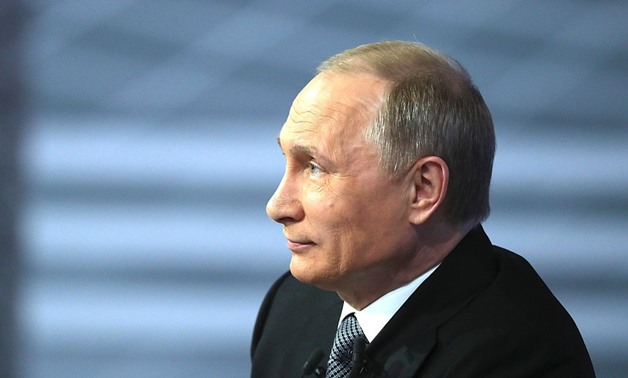
president Vladimir Putin via kremlin
WASHINGTON - 17 June 2017:The United States has raised hackles in Europe with its proposal to impose more sanctions against Russia. The tensions are reminiscent of previous transatlantic disputes over the idea that companies worldwide are subject to US law.
The following is what you need to know about the uptick in transatlantic trade tensions:
The US Senate overwhelmingly approved legislation Thursday that would slap new sanctions on Moscow, notably including infrastructure deemed crucial for Europe: the pipelines that transport Russian gas.
The bill, which still needs to pass the House of Representatives and be signed by Donald Trump, gives the president authority to impose sanctions on people or enterprises that provide goods, services or technology that "directly or significantly" contribute to construction of Russian energy export pipelines.
The measure specifically targets investments with a value exceeding $1 million per transaction, or a total of $5 million or more over a year.
The penalties would also limit the capacity of sanctioned companies to borrow from US banks, depriving them of US hard currency and limiting the ability of Americans to buy their shares.
If they becomes law, the sanctions could affect several large European companies involved in financing Nord Stream 2, a planned twin pipeline which should accelerate the flow of Russian natural gas to Germany beginning in 2019.
Potential targets include French gas distributor Engie; German firms Uniper (which split from EON) and Wintershall (BASF); Austria's OMV; and Anglo-Dutch Shell. All are partners in the 9.5-billion-euro ($10.6 billion) project.
In their bill, the lawmakers make no mystery of their opposition to the gas pipeline, which has also been criticized by European Council President Donald Tusk.
The US government continues to "oppose the Nord Stream 2 pipeline given its detrimental impacts on the European Union's energy security, and Washington should "prioritize" the export of US gas as a way to create American jobs, according to the bill, which has aroused the ire of Germany and France.
The visceral European reaction reflected anger over the "red line" that was crossed with the bill, Rory MacFarquhar, a former aide to Barack Obama, told AFP.
"The Obama administration philosophy was that the sanctions would be more effective if there was unity between the US and Europe over what the target and the approach were," he said.
"What unity required was that the US respects certain red lines, and the biggest red line was that the sanctions shouldn't affect energy supply into Europe," added MacFarquhar, now an expert at the Peterson Institute for International Economics.
"The Senate has just torn up that all approach."
This is not the first time US law and American propensity to impose its morality on business models have led to a fracas with partners across the Atlantic.
The US Foreign Corrupt Practices Act (FCPA) of 1977 allows the government to monitor questionable payments of a company anywhere in the world when that company is listed on US markets or conducts transactions in the American financial system.
Several European firms have already have been ensnared. In 2008, Siemens was forced to pay a record $800 million after pleading guilty to bribing officials, including in Argentina and Venezuela.
In 2014, France's Alstom paid a $772 million fine for bribery in Indonesia, Egypt, Saudi Arabia and Bahamas.
The most emblematic transatlantic dispute was not linked to the FCPA, but to sanctions violations.
French bank BNP Paribas was ordered to pay a staggering $8.9 billion settlement in 2014 to resolve claims it violated sanctions on doing business with Sudan, Cuba and Iran.
Several French entities expressed frustration, some criticising apparent "abuse of power" by the United States.

Comments
Leave a Comment